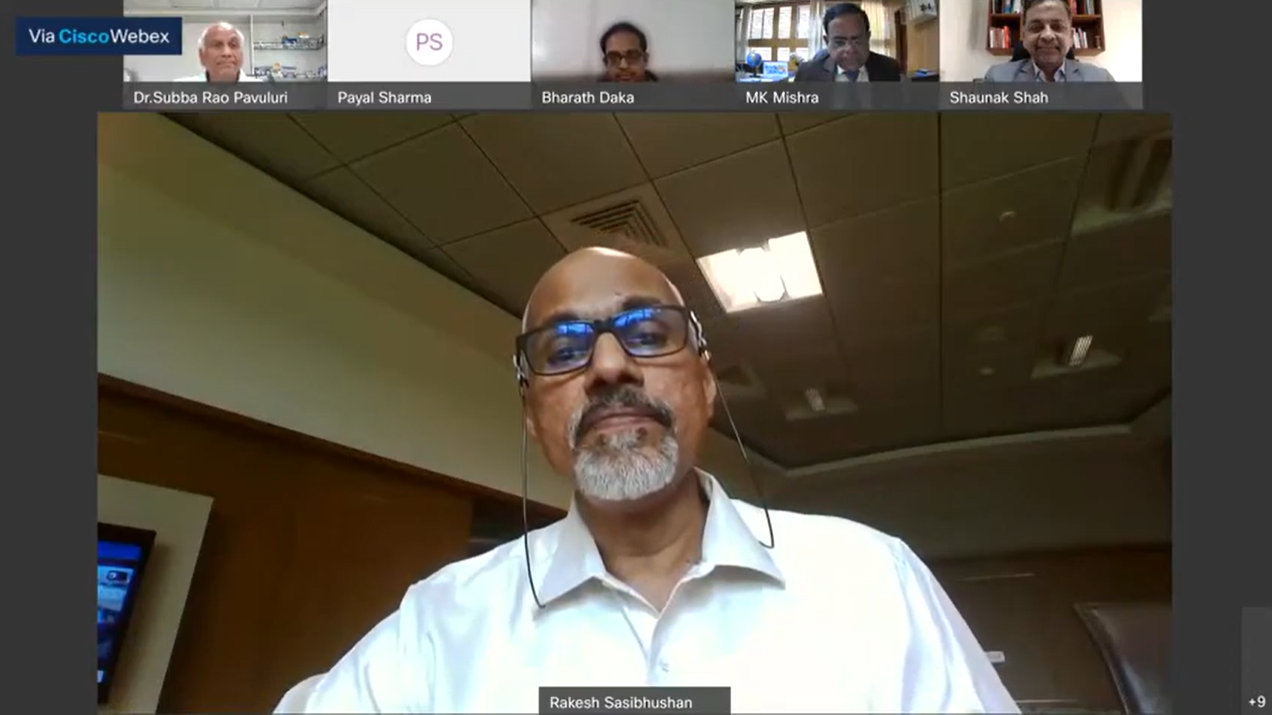In January 1967, the US, the UK and the Soviet Union opened a treaty approved by the United Nations called the Outer Space Treaty, which has since been signed by over 110 nations. This would go on to become the backbone of international space law, and according to the treaty - Space is for everyone.
Nations unanimously agree that space must be explored together in cooperation with public, private, and international players.

Rakesh Sasibhushan, Chairman & Managing Director, ANTRIX Corporation [Image Credit: International Space Conference and Exhibition 2021]
At the International Space Conference and Exhibition on ‘Building NewSpace in India’, held online from September 13 to 15, Rakesh Sasibhushan, Chairman & Managing Director, ANTRIX Corporation quoted data from a report by Space Foundation, and said that the global space industry grew by 4.4 percent in 2020 to become a $447 billion economy.
However, India’s contribution currently accounts for less than 2 percent. That said, the new space reforms announced by the government last year, to include private participation in the space-tech sector, are aimed at improving India’s share in the global market.
“We need not worry about India’s share being small, because now that the sector is de-regulated, and all the bricks are put into place, a strong domestic space economy will be built, and we will improve those figures substantially,” said Rakesh.
He added that the Indian space-tech industry can be built upon four pillars - liberal geospatial policy, level playing field, availability of ISRO facilities for private companies, and predictable policy and regulatory environment.
“For building the ecosystem, it is very important to enable the industry with foreseeable demand, funding mechanisms, and technology,” he further said, adding that it is now more important than ever to ensure that technology reaches the industry to help them kickstart their own programmes.

Image Credit: Shutterstock
2020: A turning point in Indian space-tech
A slew of new reforms in the space-tech sector was announced last year by the Union Cabinet, rendering space-tech as the new buzzword in the startup ecosystem.
The formation of the Indian National Space Promotion and Authorisation Centre (IN-SPACe), an extension of ISRO, which is aimed at monitoring private players involved in space-related activities, was one of them.
Several space-tech startups are now working with ISRO to further the space economy. The Department of Space recently signed an MoU with Hyderabad-based space-tech startup Skyroot Aerospace for access to ISRO facilities and expertise for the development and testing of subsystems/systems of space launch vehicles.
At the conference, Dr. K. Sivan, Chairman at ISRO and Secretary of Department of Space, GOI, said that IN-SPACe received requests from as many as 40 space companies including recently formed startups, and it is now assessing the applications. He revealed that once IN-SPACe is installed, it will act as a link between ISRO and private sector companies.
Abhinav Anuket, Co-founder & Managing Partner, Starburst Aerospace, India, said the time was ripe for entrepreneurs and startups to explore opportunities in the field.
These new developments are also attracting investor interest in space-tech sector. This May, Agnikul Cosmos and Skyroot Aerospace each announced the raise of $11 million in their Series A funding round, the most raised in a single deal by Indian private space sector operators to date. Prior to this, small satellite startup Pixxel had raised a $7.3 million seed funding round in March this year.
Rohan M Ganapathy, CEO and CTO of Bellatrix Aerospace explained that the Indian space industry has the latest technology with them, however, if more investment opportunities are made easily accessible, the startups can grow to their highest potential.
Industry goal? Increase India’s contribution in the global market
The formation of IN-SPACe is mainly aimed at monitoring the private players and to work with them to help increase India’s contribution in the global market from 2 percent to a double-digit number.
During the event, Dr Pawan Goenka, Chairman Designate, IN-SPACe and Member, National Council, CII, set the target to increase India’s contribution to 10 percent in the global market. He added that the only way to achieve this goal is by setting a target, finding a strategy, putting action plans together and defining the responsibilities for stakeholders, and monitor progress.
Dr. Pawan also said that he is looking forward to the emergence of space unicorns in the coming years.
With the sector opening up, new reforms, and support from ISRO, Srinath Ravichandran, Co-founder and CEO of Agnikul Cosmos said that the onus is now on startups and private players to take the Indian space sector to the next level.
Moreover, NewSpace India Ltd (NSIL) Chairman and Managing Director D. Radhakrishnan also revealed that soon, India's Polar Satellite Launch Vehicle (PSLV) will be made by Indian industries which will be followed by other rockets.
While the private sector is gearing up to further the Indian space sector, stakeholders have highlighted the importance of having policies to help clear the way for their own missions.
Dr. Pawan revealed that IN-SPACe will have a regulatory mechanism, that is currently undergoing departmental reviews and inter-ministerial consultations. Apart from this, the Space Bill is also under review, he informed.
YourStory’s flagship startup-tech and leadership conference will return virtually for its 13th edition on October 25-30, 2021. Sign up for updates on TechSparks or to express your interest in partnerships and speaker opportunities here.
For more on TechSparks 2021, click here.
Edited by Anju Narayanan
Link : https://yourstory.com/2021/09/private-players-can-be-co-traveler-indias-space-journey-space-tech
Author :- Shreya Ganguly ( )
September 17, 2021 at 05:15AM
YourStory


